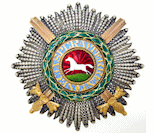Royal Order of the Guelphs of Hanover
 The Royal Order of the Guelphs of Hanover was used only briefly in the UK until 1837. The style by which the order is described in the statutes is not the Guelphic Order, as it is familiarly designated in England. The Royal Order of the Guelphs of Hanover (three classes) was instituted by George, prince regent, afterwards George IV of Great Britain, in 1815. The Order of St George (one class only) was instituted by King Ernest Augustus I in 1839 as the family order of the house of Hanover; and the Order of Ernest Augustus by George V of Hanover in 1865. These orders have not been conferred since 1866, when Hanover ceased to be a kingdom, and the Royal Guelpkic Order, which from its institution was more British than Hanoverian, not since the death of William IV in 1837. The last British grand cross was the late duke of Cambridge. The order consists of grand erosiei, commanders, and knightt, and is both a civil and a military distinction. It is sometimes styled the "Order of Merit."
The Royal Order of the Guelphs of Hanover was used only briefly in the UK until 1837. The style by which the order is described in the statutes is not the Guelphic Order, as it is familiarly designated in England. The Royal Order of the Guelphs of Hanover (three classes) was instituted by George, prince regent, afterwards George IV of Great Britain, in 1815. The Order of St George (one class only) was instituted by King Ernest Augustus I in 1839 as the family order of the house of Hanover; and the Order of Ernest Augustus by George V of Hanover in 1865. These orders have not been conferred since 1866, when Hanover ceased to be a kingdom, and the Royal Guelpkic Order, which from its institution was more British than Hanoverian, not since the death of William IV in 1837. The last British grand cross was the late duke of Cambridge. The order consists of grand erosiei, commanders, and knightt, and is both a civil and a military distinction. It is sometimes styled the "Order of Merit."
Though no longer a British Order of Knighthood, it was for nearly a quarter of a century destitute of any of the characters of a foreign distinction, and British subjects have more largely participated in its honours than any of the natives of Hanover. Its Sovereign was, till the accession of Queen Victoria, the King of England, and its name and foundation inseparably connect it with his race. The Hanoverian troops having much distinguished themselves at the battle of Waterloo, George IV (then prince regent) determined to found an order of merit, which might, with especial propriety, be conferred upon such of them as deserved the distinction, and the 12th of August, 1815, was fixed upon as the date of its foundation.
The name Guelph is derived from that of the great German house of the Welfs or Guelfi. These, in the 12th century, were dukes of Bavaria ; and carried on war in Germany with the house of Hohenstauffen. The Gutlphs or Guelfs were a powerful faction of the middle ages which was opposed to the German emperors and their adherents, the latter of whom were called Ghibelines. The antagonism between these two parties resolved itself into a struggle between the secular and spiritual powers, the Ghtbtlinet sustaining the cause of the emperor, while the Guelfs stood by the pope. The wars between the two contending parties deluged Italy with blood for nearly three centuries.
Upon the death of Frederick II, Christian Lewis succeeded in Brunswick, while Ernest Augustus appeared as Duke of Hanover. Ernest was made an elector in 1692, and continued to reign until his death in 1698, when he was succeeded by George Lewis, who, upon the death of his uncle, George William, in 1705, inherited the Dukedom of Zell, and in 1714 ascended the throne of England as George I; since which time the house of Hanover continued to supply the throne of England with sovereigns. Hanover was raised to the rank of a kingdom during the reign of George III, in 1814. The succession was the same in both countries until the death of William IV, when, by the Salique law, Victoria was prevented from assuming the crown of Hanover, and it consequently descended to the next male heir, who was the Duke of Cumberland.
By George IV the Order was conferred very sparingly upon British subjects; but William IV. distributed its ensigns iu considerable numbers amongst military and naval officers who were ineligible for the Order of the Bath, among the great officers of his majesty's household, and among many who had distinguished themselves in arts, in science, and in literature. To such an extent did William IV carry this, that by promotions from the lower classes to the higher, or by new creations, he made, within the short space of seven years, the number of 569 nominations among his British subjects; viz. 79 G.C.H., 148 K.C.H., and 342 K.H. The officers of the order consist of six, viz. a Chancellor, a Vice-chancellor, a Secretary, a King of anus, a Genealogist, and a Registrar.
No one upon whom this Order has been conferred is entitled to the appellation of "Sir," or the privileges and precedence of a knight bachelor, whether he has been appointed by the present Sovereign of the Order, or by those who were likewise monarchs of this country. The accolade, or imposition of the sword by which knights bachelor are created, is always necessary to give them this prefix, unless they also happen to be knights of the Bath.
|
NEWSLETTER
|
| Join the GlobalSecurity.org mailing list |
|
|
|

